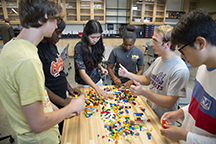Polytechnic Institute offers Purdue's first competency-based degree
 |
|
Purdue President Mitch Daniels, from left, and Gary Bertoline, dean of the College of Technology, listen as student David Tishmack speaks during an event announcing the university's first competency-based degree. Tishmack, is a first-year mechanical engineering technology student in the Polytechnic program. (Purdue Univesity photo/Mark Simons) |
WEST LAFAYETTE, Ind. – The Purdue Polytechnic Institute launched the university's first competency-based bachelor's degree this fall.
Purdue President Mitch Daniels earlier this year challenged the colleges to create such a degree — a key element of the university’s Purdue Moves initiatives — offering a $500,000 prize. The College of Technology, newly redesigned as Purdue Polytechnic Institute, was the first to succeed, creating a transdisciplinary program based on learned and demonstrated competencies. It integrates methods of learning that are driven by students’ passions and interests and, importantly, by the needs of the marketplace.
"I'm very pleased to announce that Purdue Polytechnic Institute has created a dynamic, integrated degree program proposal that will allow students to move as fast as their ability and diligence will permit, reducing their time to degree and their costs as they do so," Daniels said.
"We hope that this degree program will serve as a model for other Purdue academic programs that lend themselves to competency-based education. Many postgraduate jobs in our market are structured around entirely competency-based models, and so by introducing students to such a model early, we can prepare them for a lifetime of professional success."
Competency-based degrees are awarded based on demonstrated mastery of concepts and skills rather than performance measured only at fixed calendar intervals of classroom time.
 |
|
Incoming Purdue Polytechnic Institute freshmen try out exercises to work on team building and collaboration. (Purdue University photo/Mark Simons) |
In traditional grading, letter grades serve as a general indicator of a student's classroom accomplishment, while competencies, such as those that are a part of the Purdue Polytechnic Institute's proposal, effectively let employers know what graduates are able to do. For example, in an object-oriented programming course, students would need to successfully complete three competencies: object-oriented foundations, programming control structures and complex data structures. Within each, students would work at their own pace to master specific concepts, vocabulary, software and uses.
Competencies have also been identified for higher order skills, such as information literacy. Students would work through a cluster of competencies to demonstrate skills such as making informed decisions (informed designer), organizing and capturing knowledge for a team (knowledge manager), or curating data.
The national interest in competency-based education, also called direct assessment, comes on the heels of U.S Department of Education guidelines released last year for institutions wanting to provide federal student aid to enrollees in such programs. In July, the U.S. House of Representatives also passed legislation that further enables institutions offering competency-based degrees to participate in federal student aid programs.
Purdue Polytechnic Institute faculty spent a year working to create the proposed transdisciplinary degree. In the process, faculty examined all aspects of higher education and incorporated the latest research about human learning and motivation. The degree program will be open to students in any discipline. Learning will be organized around themes and driven by problems rather than "seat time," and students will receive credentials based on demonstrated competencies.
For this fall, Purdue Polytechnic Institute has accepted a pioneering cohort of 36 students. By fall 2015, Purdue is planning to begin admitting about 100 students to the program. Graduates will earn the same degree but with one or more concentrations that reflects their interests and passions. Some of these concentrations will correlate to existing Purdue majors; others will emerge from the program's environment.
For example, the degree program can allow agriculture students interested in mobile app design to learn how to create an app that helps farmers identify the best markets for their crops. Similarly, the program can allow an English student interested in writing game scripts to learn how to animate storyboards as he or she scripts them.
Instead of attending classes about a specific topic, the program's students will attend concurrent, group-learning sessions that involve multiple subjects.
"As we work to transform the College of Technology, we also will examine how our degree programs can mesh with the current and emerging needs of today's employers in high-tech, advanced manufacturing and innovation," Dean Gary Bertoline said. "We also will partner with our colleagues across campus as we work on competency-based programs to create innovative degree programs that integrate technology with other disciplines."
Examples of these types of offerings, Bertoline said, could include degrees in aviation financial analysis or unmanned aerial systems or concentrations on integrated manufacturing systems.
The program initially will involve 18 faculty members from the colleges of Education, Engineering, Liberal Arts, Technology and Science, and Purdue University Libraries. Each student will have a faculty mentor who stays with him or her throughout their program studies.
While project-based senior projects have been a part of the College of Technology in varying degrees for years, as Purdue Polytechnic Institute evolves, these projects would take on even more importance.
"We want to make it an expectation that all of our students complete an industry-sponsored senior project," Bertoline said. "In the second year of such a program in our School of Engineering Technology, we have 35 industry-sponsored projects lined up, which provide work-team experience, exposure to project demands and timelines, and most important, industry contacts for after graduation."
Related information:
Fact sheet on Purdue Polytechnic Institute and competency-based education
http://news.uns.purdue.edu/images/2014/140905FactsheetPPI.pdf
Fact sheet on Purdue College of Technology:
http://news.uns.purdue.edu/images/2014/140905FactsheetCOT.pdf

